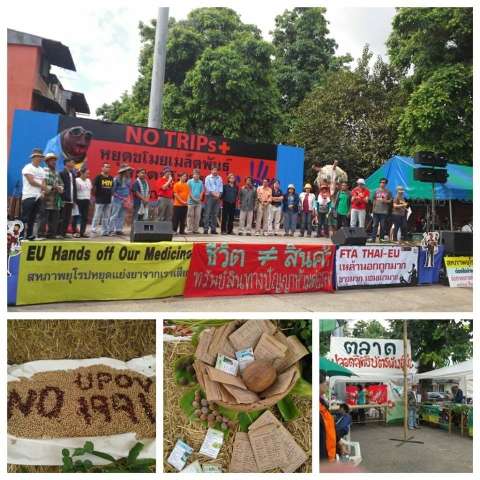STATEMENT OF THE EU-ASEAN NETWORK IN SUPPORT OF THE FTA WATCH CAMPAIGN ON THE EU-THAILAND FTA
This statement was sent to Dr. Olarn Chaipravat, President of Thailand Trade Representative Office through FTA Watch Thailand. The 2nd round of Thai-EU talks are underway in Chiangmai from 16-20 September 2013.
13 September 2013
The negotiations for a region-wide EU-ASEAN FTA were launched in 2007 under the mantle of EU’s new partnerships with Asia. A year later the world was hit by a global economic crisis, the effects of which continue to reverberate not least in the EU. In 2010, the EU set aside the regional approach to FTA negotiations with ASEAN because it failed to deliver the level of ambition that the EU was hoping for. The EU has since secured an FTA with Singapore, and pursuing negotiations with Malaysia, Vietnam and Thailand.
These bilateral FTA talks draw from the same EU-ASEAN mandate which means that the agreements that would be forged out of these talks within the region would be comparable if not similar to one another in terms of the process of negotiations, the substantive elements, and the level of ambition.
The EU-ASEAN network has been monitoring these bilateral negotiations in the region through national level campaigns initiated by social movements and civil society organizations including FTA Watch in Thailand. These people’s campaigns have raised serious concerns about the possible threats posed by the FTA on peoples’ health and access to medicines, the right to food, the environment, and rural livelihoods. There is likewise a big concern over the erosion of policy space that these agreements could cause stifling the ability of governments to come up with effectively policies in the name of public interest.
What the EU is pushing in FTA talks with ASEAN are new generation free trade and investment agreements. Like the Trans Pacific Partnership Agreement (TPPA), the EU FTAs are aiming for higher standards of liberalization not just in trade in goods and services, but in intellectual property rights, investments and investor protection.
We are watching closely the negotiations for an EU-Thailand FTA not just on the possible implications on Thailand but on the rest of the region.
Two major concerns that stand out because of the possible grave impact on people’s rights and the erosion of policy space are over issues relating to the chapters on intellectual property rights and investments.
People’s opposition to the EU FTAs in ASEAN have galvanized around these two issues. As EU and Thai negotiators go to the 2nd round of talks for an EU-Thailand FTA, allow us to reiterate our concerns:
We are concerned that the negotiations would include provisions on intellectual property rights that are beyond current WTO commitments on Trade-Related Intellectual Property Rights (TRIPS Plus), would undermine TRIPS flexibilities, and would threaten peoples access to quality but affordable medicines. Thailand is no stranger to the use of these flexibilities and championing the cause of public health. Its efforts to issue compulsory licenses for HIV-AIDS and cancer drugs are well documented. We therefore urge the Thai negotiators to heed the warnings and stand firm on this commitment for public health.
Similar warnings have come from the United Nations Development Program (UNDP) and the UNAIDS program, which have come out strongly against these TRIPS plus provisions in FTAs and their impact on public health. The report concludes “to retain the benefits of TRIPS Agreement flexibilities, countries, at minimum should avoid entering into FTAs that contain TRIPS-plus obligations that can impact on pharmaceuticals price or availability.”
We are also concerned over the investment chapter in FTAs being pushed by the EU which would afford greater protection and rights for corporations including the right to sue governments over certain policies and regulations. We are deeply concerned over the agenda of the EU to include investor to state dispute mechanism as an integral part of the investment chapter in its FTAs with ASEAN countries.
Aside from the million dollar claims of corporations, litigating these cases already constitute a big burden on tax payer’s money. Furthermore, an ambitious investment chapter could further erode the policy space needed by government to regulate investments and safeguard and protect the public interest as it pursues its development objectives.
We join FTA watch and the Thai campaign on the EU-Thailand FTA in raising these concerns and we express our deep solidarity with the Thai people as they gather in Chiangmai to express these concerns and articulate their demands to the Thai government.#
Contact person: Joseph Purugganan, Coordinator, EU-ASEAN FTA Campaign Network. [email protected], Telephone Numbers : +639228299450








